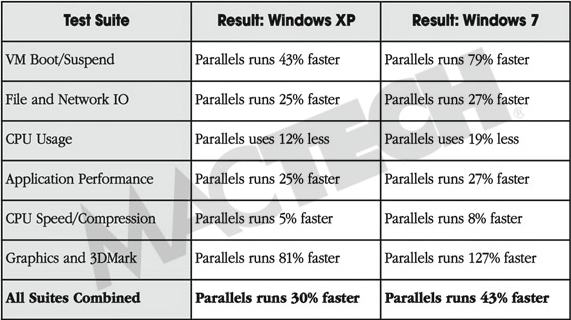Parallels faster than VMware in virtualization head-to-head
MacTech Magazine, in an exhaustive series of tests spanning eight pages, came to several main conclusions after putting VMware Fusion 3 and Parallels Desktop 5 though its gauntlet of benchmarks. While both virtualization programs are excellent products, Parallels Desktop was the clear winner - running an average of nearly 30% faster than its competitor over the course of the test suite. Parallels largest gains can be seen in graphics, gaming, and 3D performance.
"If gaming, graphics, and 3D are your thing, you have no choice. Parallels Desktop has so much better graphics support, and is so much faster in most of the comparisons, there's simply no contest," writes MacTech.
Speed should not be the only determinant in deciding on virtualization software, however.
"In the end, your decision as to which product you should take into account what's most important to you: speed, footprint, graphics capabilities, features, user interface, OS you want to run, and more all come into play."
Improvements in Windows 7 as well as in virtualization technology can account for a diminishing "Vista penalty" in performance versus WIndows XP. While Windows 7 performs better than its Vista predecessor, MacTech still recommends sticking with Windows XP due to the fact that it still outperforms Microsoft's latest OS in virtualization tests.
Regarding the allocation of RAM in a virtual machine, more is not always better. MacTech found that more RAM actually leads to longer launch times, suspends, and resumes. It recommends 512MB to 1GB of VM RAM under normal circumstances.
 Brian Garner
Brian Garner








 Amber Neely
Amber Neely
 Thomas Sibilly
Thomas Sibilly
 AppleInsider Staff
AppleInsider Staff
 William Gallagher
William Gallagher
 Malcolm Owen
Malcolm Owen
 Christine McKee
Christine McKee










70 Comments
Parallels 5 is definitely an improvement over 4. Aero is fully supported and the machine runs fast and start up quick. I did a trial of Fusion, but it did not click with me for some reason, but as always they one up each other with every release so Fusion 4 is gonna be better the parallels 5 when it comes out. Not much difference really, except for release schedule.
MacTech found that more RAM actually leads to longer launch times, suspends, and resumes. It recommends 512MB to 1GB of VM RAM under normal circumstances.
[ View this article at AppleInsider.com ]
512MB to 1 GB are not normal for my usage. I wonder about the relative performance when 2-4 GB memory are assigned to the VM; and how their Linux performance rates.
Shame they didn't compare virtualbox. It would have provided a datapoint as to how much better PD or VMWare was in comparison to Sun's free vm. Or not better in some areas...
I love VirtualBox. I bought VMWare Fusion, but between bouncing between multiple machines, and sick of trying to dig out my license code for Fusion, I found VirtualBox alleviated a lot of headaches.
I'm good with Fusion.